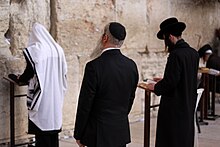Yahudawa
Yahudawa; kalmar Yahudawa jam'i ce, tilo kuma ana cewa Yahudu sune mabiya addinin Yahudanci na Annabi Musa, yawancin su suna Yaren Ibrananci ne wanda suke da rinjaye a kasar Isra'ila, Falasdinu da kuma Amurka, ana kiran su da Yahudawa ne saboda addininsu na da asali da Annabi Yusuf izuwa ga baban sa annabi Yakub.[1][2][3][4][5][6][7][8]
יהודים | |
|---|---|
 | |
| Jimlar yawan jama'a | |
| 14,606,000 | |
| Yankuna masu yawan jama'a | |
| Isra'ila | |
| Harsuna | |
|
Ibrananci, Knaanic (en) | |
| Addini | |
| Yahudanci | |
| Kabilu masu alaƙa | |
| mutane |






Yawancin Yahudawa suna cikin yankin Nahiyar Asiya ne.[9][10][11][12][13][14]
Manazarta.
gyara sashe- ↑ Raymond P. Scheindlin (1998). A Short History of the Jewish People: From Legendary Times to Modern Statehood. Oxford University Press. pp. 1–. ISBN 978-0-19-513941-9. Israelite origins and kingdom: "The first act in the long drama of Jewish history is the age of the Israelites"
- ↑ Facts On File, Incorporated (2009). Encyclopedia of the Peoples of Africa and the Middle East. Infobase Publishing. pp. 337–. ISBN 978-1-4381-2676-0."The people of the Kingdom of Israel and the ethnic and religious group known as the Jewish people that descended from them have been subjected to a number of forced migrations in their history"
- ↑ Harry Ostrer MD (10 August 2012). Legacy: A Genetic History of the Jewish People. Oxford University Press. pp. 26–. ISBN 978-0-19-997638-6.
- ↑ "In the broader sense of the term, a Jew is any person belonging to the worldwide group that constitutes, through descent or conversion, a continuation of the ancient Jewish people, who were themselves descendants of the Hebrews of the Old Testament." Jew at Encyclopædia Britannica
- ↑ "Hebrew, any member of an ancient northern Semitic people that were the ancestors of the Jews." Hebrew (People) at Encyclopædia Britannica
- ↑ Eli Lederhendler (20 December 2001). Studies in Contemporary Jewry: Volume XVII: Who Owns Judaism? Public Religion and Private Faith in America and Israel. Oxford University Press. pp. 101–. ISBN 978-0-19-534896-5. "Historically, the religious and ethnic dimensions of Jewish identity have been closely interwoven. In fact, so closely bound are they, that the traditional Jewish lexicon hardly distinguishes between the two concepts. Jewish religious practice, by definition, was observed exclusively by the Jewish people, and notions of Jewish peoplehood, nation, and community were suffused with faith in the Jewish God, the practice of Jewish (religious) law and the study of ancient religious texts"
- ↑ Tet-Lim N. Yee (10 March 2005). Jews, Gentiles and Ethnic Reconciliation: Paul's Jewish identity and Ephesians. Cambridge University Press. pp. 102–. ISBN 978-1-139-44411-8. "This identification in the Jewish attitude between the ethnic group and religious identity is so close that the reception into this religion of members not belonging to its ethnic group has become impossible."
- ↑ Ernest Krausz; Gitta Tulea. Jewish Survival: The Identity Problem at the Close of the Twentieth Century; [... International Workshop at Bar-Ilan University on the 18th and 19th of March, 1997]. Transaction Publishers. pp. 90–. ISBN 978-1-4128-2689-1. "A person born Jewish who refutes Judaism may continue to assert a Jewish identity, and if he or she does not convert to another religion, even religious Jews will recognize the person as a Jew"
- ↑ "Facts About Israel: History". GxMSDev.
- ↑ K. L. Noll, Canaan and Israel in Antiquity: A Textbook on History and Religion, A&C Black, 2012, rev.ed. pp.137ff.
- ↑ Thomas L. Thompson, Early History of the Israelite People: From the Written & Archaeological Sources, BRILL, 2000 pp. 275–76: 'They are rather a very specific group among the population of Palestine which bears a name that occurs here for the first time that at a much later stage in Palestine's history bears a substantially different signification.'
- ↑ John Day, [In Search of Pre-Exilic Israel,] Bloomsbury Publishing, 2005 pp. 47.5 p.48:'In this sense, the emergence of ancient Israel is viewed not as the cause of the demise of Canaanite culture but as its upshot'.
- ↑ Day, pp. 31–33, p.57.n.33.
- ↑ Rainer Albertz, Israel in Exile: The History and Literature of the Sixth Century B.C.E. Society of Biblical Lit, 2003 pp. 45ff: 'Since the exilic era constitutes a gaping hole in the historical narrative of the Bible, historical reconstruction of this era faces almost insurmountable difficulties. Like the premonarchic period and the late Persian period, the exilic period, though set in the bright light of Ancient Near Eastern history, remains historically obscure. Since there are very few Israelite sources, the only recourse is to try to cast some light on this darkness from the history of the surrounding empires under whose dominion Israel came in this period.'